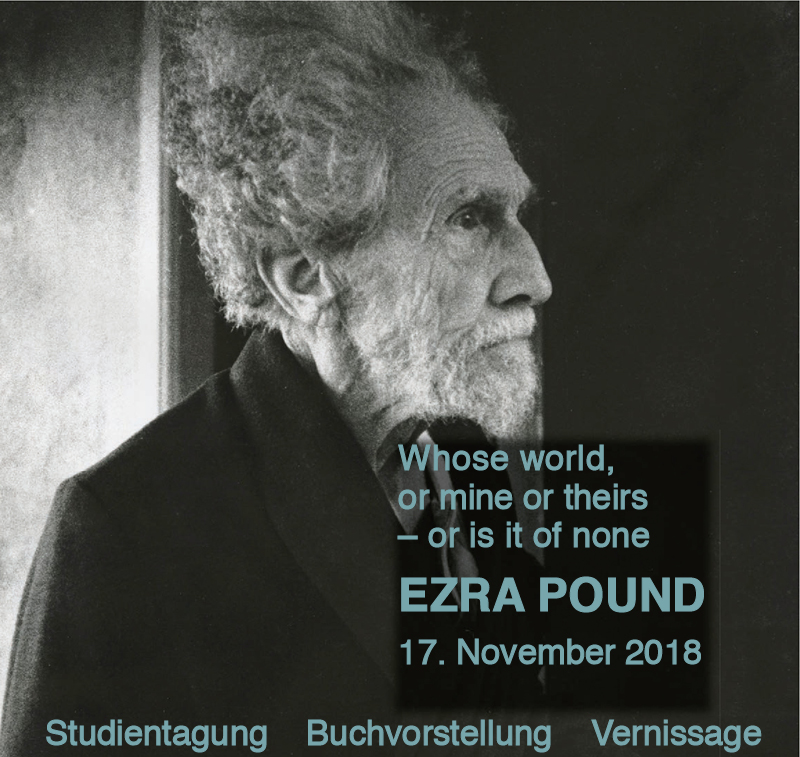
“Whose world, or mine or theirs – or is it of none” (Canto LXXXI)
Ezra Pound Research Center, 17. November 2018
‘Ezra Pound, an intellectual among intellectuals’ is the title of the international seminar that will take place at the Academy of German-Italian Studies Merano, Innerhoferstrasse 1, on Saturday 17 November from 10.00 am. The event, organised by the Ezra Pound Research Centre under the academic direction of Roberta Capelli (University of Trento) and Ralf Lüfter (University of Bolzano), is the second meeting after the ‘Pound lettore di Dante’ conference in 2016.
The occasion for the topic of this issue is provided by an event from Pound’s biography: 60 years ago, in 1958, Ezra Pound, who had returned to Brunnenburg with the family of his daughter Mary de Rachewiltz from the Washington lunatic asylum where he had been imprisoned in 1946 after being accused of treason for his anti-American radio talks. His figure of a committed intellectual and artist, a modern school founder, poet, brilliant essayist and promoter of other talents (such as T.S. Eliot), controversial economist and upright idealist has always favoured the establishment of a very wide network of cultural and human relations. This is also testified by the multitude of letters he sent to his relatives, friends, colleagues as well as those letters that speak about him even without him. “I met you personally just to talk to you about Ezra Pound, remember? A sympathetic incident,” writes Vanni Scheiwiller, the least traditional editor of some of Pound’s most controversial works, in an unpublished letter of 21 January 1956 to Giuseppe Ungaretti. With this letter, Carlo Pulsoni, professor at the University of Perugia, will open the work of the Merano Study Day, coordinated by Stefano Maria Casella, to reconstruct the background of the Italian petition for Pound’s release. Through James Joyce, on the other hand, came the long dialogue – which Maurizio Pasquero has recreated with archaeological skill – between Pound and the writer Carlo Linati, the “Lombard friend” named in the pamphlet ‘Jefferson and/or Mussolini’ (1935), with whom he shared trips to Milan and literary projects that were never realised (including a four-handed collection of texts by Anglo-American authors). Pound recalls the latter in a letter he wrote to Linati’s widow from St Elizabeths, through “the pleasure of not getting along with each other”. Pound’s letter collections still contain a great deal of first-hand material, such as that collected by Manlio Della Marca (Ludwigs-Maximilian-Universität Munich) to link two not at all self-evident personalities of Pound’s “galaxy”: Eva Hesse, the most famous translator of Pound’s works into German, and Marshall McLuhan, the prophetic media theorist. After all, many of Pound’s intuitions, for all their contradictions, proved to be pioneering and were only understood late. A late recognition came, for example, from Pier Paolo Pasolini, sealed in a famous 1967 TV interview that the young researcher Sean Mark used as a turning point for his own comparison between these two different and controversial intellectuals, but linked by the same notion of the poet as a public figure connected to actuality and the world, even with tragic, as in Pasolini’s case, or catastrophic outcome, as in Pound’s case. The last Pound is no longer the irreverent catalyst of that AngloLiguria and beloved Rapallo of which his most famous connoisseur and translator Massimo Bacigalupo will describe, down to the most unknown details, the cosmopolitan atmosphere and notable guests (Hemingway, Yeats, Zukovsky…) of the 1920s and 1930s.
The last Pound is the cloaked spirit, “the poet’s shadow”, which the Genoese photographer Lisetta Carmi can stop for a few minutes at the entrance door to Sant’Ambrogio degli Zoagli in 1966 to create those twelve black and white portraits that Siegfried de Rachewiltz will present at 7 p.m. and that will be exhibited at the Merano Academy from Saturday to 25 November. “Pound was aware that he had not been understood. The fault was not so much in the work, but in not having managed to be understood. He did not manage to talk to people the way he wanted to,” says Mary de Rachewiltz in the book ‘Ho cercato di scrivere paradiso. Ezra Pound nelle parole della figlia’ by the poet and writer Alessandro Rivali.
